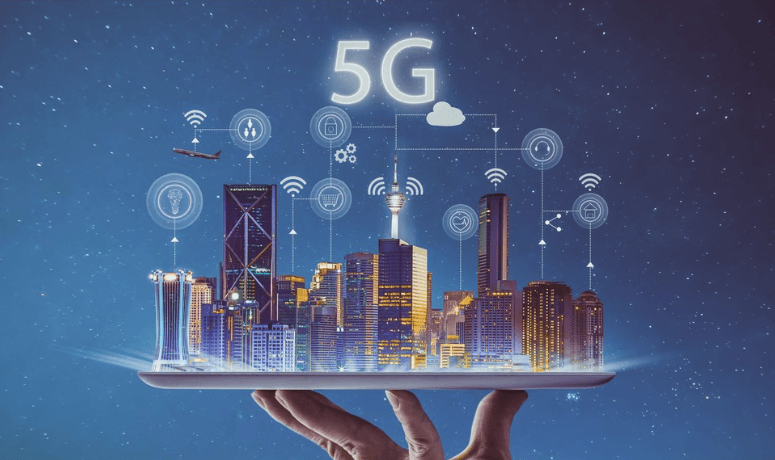How 5G Will Transform Communication and Connectivity

The advent of 5G technology promises to bring profound changes to the world of communication and connectivity. While its full capabilities are still being explored, it is already clear that 5G will usher in a new era of connectivity. With faster speeds, lower latency, and greater reliability, 5G is set to transform industries, businesses, and our personal lives in ways previously unimaginable. In this article, we will explore how 5G will revolutionize the way we communicate, access information, and connect with the world around us.
Introduction to 5G Technology
What is 5G?
5G, short for “fifth generation,” represents the next major milestone in mobile communication technology, following 4G. This new wireless standard is designed to meet the growing demand for faster speeds, more reliable connections, and the ability to support billions of devices simultaneously. Unlike its predecessors, 5G is not just about offering faster internet speeds for mobile phones—it is about enabling a more connected and intelligent world across various industries.
See also: The Future of Artificial Intelligence: How AI Is Shaping Our World
A Brief Comparison with Previous Generations of Mobile Networks
The transition from 4G to 5G brings several improvements. While 4G allowed for higher speeds and reliable connections, 5G takes these capabilities to the next level with:
- Faster speeds: 5G can achieve download speeds up to 100 times faster than 4G.
- Lower latency: The delay in data transmission is significantly reduced, making communication almost instantaneous.
- Increased capacity: 5G can handle a far greater number of connected devices, supporting the growing Internet of Things (IoT).
These advancements set the stage for a new era of connectivity and innovation.
The Speed Revolution: Ultra-Fast Communication
Enhanced Mobile Broadband
One of the key benefits of 5G is its ability to deliver incredibly fast internet speeds. With 5G, users can expect download speeds of up to 10 gigabits per second (Gbps)—a far cry from the 100 megabits per second (Mbps) provided by 4G. This speed enhancement will not only benefit everyday activities like browsing and streaming but will also be transformative for industries that require large amounts of data transfer in real-time.
For example, video streaming platforms will be able to deliver ultra-high-definition (UHD) or even 8K content seamlessly, without buffering. Additionally, 5G’s speed is crucial for industries such as autonomous vehicles, where rapid data exchange is essential for safety and performance.
Impact on Downloading, Streaming, and Online Gaming
With 5G, downloading large files, streaming high-quality videos, and playing online games with minimal lag will become the norm. For gaming, this means that mobile gaming will rise to new heights with advanced graphics, smoother gameplay, and multiplayer experiences that were previously limited by network constraints.
Low Latency: The Game Changer
What is Latency, and Why Does It Matter?
Latency refers to the time it takes for data to travel from its source to its destination. In mobile networks, lower latency is crucial for enabling real-time communication and interactions. For instance, a delay of just a few milliseconds can make a difference in applications like online gaming, video calls, or remote surgeries.
How 5G Reduces Latency for Real-Time Applications
5G promises to cut latency to as low as 1 millisecond, compared to the 30-50 milliseconds typical of 4G networks. This reduction opens up possibilities for innovations that require near-instantaneous responses, such as remote control of machinery in factories, real-time traffic management in smart cities, and virtual reality (VR) interactions in a fully immersive environment.
The Internet of Things (IoT) and 5G
The Role of 5G in Expanding IoT
The Internet of Things (IoT) refers to the growing network of interconnected devices—from smart thermostats to industrial machinery. 5G will be the backbone of IoT, allowing for faster communication between devices, enhanced automation, and real-time data sharing. This will lead to smarter homes, smarter cities, and smarter industries.
For instance, in smart homes, 5G will enable seamless control of lighting, temperature, security systems, and more from anywhere in the world. In smart cities, traffic lights, waste management, and energy distribution can be optimized using real-time data from IoT sensors powered by 5G networks.
Impact on Smart Homes, Smart Cities, and Industries
With 5G, cities will become more efficient and sustainable. Intelligent traffic systems will reduce congestion, and waste management systems will be more effective. Industries will also see the rise of fully automated factories, where machines communicate with each other in real-time, leading to faster production and minimal downtime.
5G and Autonomous Vehicles
The Connection Between 5G and Self-Driving Cars
Autonomous vehicles rely heavily on communication systems that allow them to interact with their environment, including other vehicles, traffic lights, and pedestrians. 5G will provide the low-latency, high-speed network required to enable real-time communication between these vehicles and the infrastructure that supports them.
Real-Time Communication for Vehicle Safety and Efficiency
5G’s ultra-low latency will allow vehicles to communicate instantly with each other and surrounding infrastructure. This can prevent accidents by providing vehicles with real-time updates on traffic, road conditions, and potential hazards, ultimately making transportation safer and more efficient.
Healthcare Advancements with 5G
Telemedicine and Remote Surgeries
5G will transform healthcare by enabling more advanced telemedicine solutions. With low-latency communication and high-speed data transfer, doctors will be able to perform remote consultations and even surgeries. This has the potential to greatly increase access to healthcare in remote and underserved areas.
Improving Patient Care Through Real-Time Data
5G will allow for the continuous monitoring of patients through wearable devices that transmit data in real-time to healthcare professionals. This will enable quicker response times, better patient outcomes, and a more personalized healthcare experience.
The Future of Work: 5G in Business
Remote Work, Virtual Collaboration, and the Digital Office
The shift toward remote work, accelerated by the pandemic, will be further enhanced by 5G’s capabilities. With fast, reliable connectivity, employees can collaborate virtually without lag, attend high-quality video conferences, and share large files instantly.
How 5G Will Enable Global Connectivity for Businesses
5G will allow businesses to connect offices, factories, and other facilities worldwide, ensuring that teams can collaborate seamlessly in real time, regardless of location. This will also support the growth of global e-commerce, supply chain optimization, and digital marketing strategies.
5G and Augmented Reality (AR) / Virtual Reality (VR)
Immersive Experiences Powered by 5G
Augmented Reality (AR) and Virtual Reality (VR) will be taken to new heights with 5G technology. The high-speed, low-latency network will enable more immersive, interactive experiences in gaming, entertainment, education, and more.
Impact on Gaming, Education, and Training
With 5G, AR and VR technologies will provide realistic training simulations, interactive learning experiences, and more engaging entertainment options. Industries like gaming, education, healthcare, and even defense will benefit from the high-performance capabilities of 5G-powered AR/VR applications.
The Impact of 5G on Communication Networks
How 5G Will Improve Mobile Networks
5G will significantly improve mobile networks by providing faster speeds, greater capacity, and more reliable connections. This will ensure that users can access high-quality services even in crowded areas or when traveling at high speeds.
The Shift Toward More Efficient, Scalable Networks
With its advanced network architecture, 5G will enable telecom providers to scale their services more efficiently, ensuring that connectivity remains strong even as the number of connected devices grows exponentially.
Security Considerations in the 5G Era
Enhanced Security Features of 5G Networks
As more devices become connected, security becomes a critical concern. 5G networks are designed with enhanced security features, including stronger encryption, improved authentication, and better protection against cyberattacks.
Potential Risks and Concerns in a Connected World
While 5G brings enhanced security, the increased number of connected devices also raises concerns about privacy and potential vulnerabilities. Governments, businesses, and tech companies will need to work together to address these issues.
Environmental Impact of 5G
How 5G Will Support Sustainability
5G is designed to be more energy-efficient than previous generations of mobile networks. The network’s ability to handle more devices with less power will contribute to reduced energy consumption, helping meet sustainability goals.
Reducing Energy Consumption and Enhancing Efficiency
By enabling better resource management in industries like agriculture, transportation, and manufacturing, 5G will help reduce waste, optimize energy use, and support sustainable practices worldwide.
5G’s Role in Bridging the Digital Divide
Providing Connectivity to Rural and Underserved Areas
5G has the potential to bridge the digital divide by bringing fast, reliable internet to rural and underserved communities. This will empower people in remote areas with access to education, healthcare, and business opportunities previously unavailable.
The Potential for Global Digital Inclusion
With global 5G rollout, millions of people around the world will gain access to the internet for the first time. This has the potential to lift entire communities out of poverty by providing access to critical services, information, and opportunities.
Global Rollout of 5G
Challenges and Timeline for Global 5G Deployment
The global deployment of 5G is not without challenges. These include the high cost of infrastructure, regulatory hurdles, and the need for new spectrum allocation. However, as 5G becomes more widely available, it will fundamentally change the way we live, work, and communicate.
The Role of Governments and Private Sectors in 5G Development
Governments and private companies will play key roles in facilitating 5G deployment. Governments will need to create the regulatory frameworks, while private companies will invest in the infrastructure necessary to support the technology.
The Road Ahead: Challenges and Opportunities
The Hurdles in the 5G Transition
While 5G promises incredible benefits, the transition from 4G to 5G presents several challenges. These include the need for new infrastructure, ensuring security, and addressing concerns around privacy and data management.
Future Opportunities for Innovation with 5G
Despite these challenges, the future of 5G is bright. Industries will continue to innovate, creating new applications and services that were once unimaginable. From smart cities to autonomous vehicles, the possibilities are endless.
Conclusion
5G technology is set to revolutionize communication and connectivity across industries and everyday life. Its enhanced speed, low latency, and ability to support massive numbers of connected devices will open up new possibilities for innovation. While the full potential of 5G is still being realized, it is clear that it will transform the way we live, work, and interact with the world around us.
FAQs
1. What is 5G?
5G is the fifth generation of wireless technology, offering faster speeds, lower latency, and the ability to support more connected devices compared to previous generations like 4G.
2. How will 5G improve internet speeds?
5G can offer speeds up to 100 times faster than 4G, making activities like downloading, streaming, and gaming smoother and faster.
3. How does 5G impact autonomous vehicles?
5G enables real-time communication between autonomous vehicles and their environment, improving safety and efficiency.
4. Can 5G improve healthcare?
Yes, 5G will enable better telemedicine, remote surgeries, and real-time monitoring, improving patient care.
5. What role does 5G play in the Internet of Things (IoT)?
5G will support the massive growth of IoT by enabling faster communication between billions of devices, leading to smarter homes, cities, and industries.
6. What are the security risks associated with 5G?
While 5G brings enhanced security features, the greater number of connected devices raises concerns about privacy and cyberattacks.




